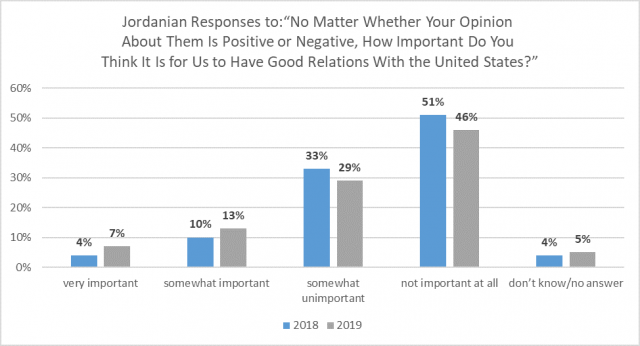
- Policy Analysis
- Fikra Forum
Jordan’s Public Still Focused on Economic Problems, but Opposition has Little Support

The government of Jordan has been adept at balancing domestic demands and international pressures in order to remain a moderate force in the Middle East, and will need to continue to take steps to ensure this delicate balance. Right now, despite continued popular concern over economic hardships, the main Muslim Brotherhood opposition movement garners support from just one-fifth (19%) of Jordanian respondents in a new survey.
Overall, the results from November’s polling reflect Jordanians’ continued desire for their country to focus on domestic concerns. Three-fourths (77%) of respondents endorse the proposition that “internal political and economic reform is more important for our country than any foreign policy issue, so we should stay out of any wars outside our borders.” This consensus has barely changed in polls taken over the past three years.
However, when it comes to which domestic issues the government should focus on, they demonstrate mixed views. For example, in line with King Abdullah’s promotion of interfaith harmony, a narrow majority (55%) agree that “we should show more respect to the world’s Christians and improve our relations with them.” However, a mere 3% say the same about Jews. Regarding interpretations of Islam, a narrow majority express disapproval with the idea of moving them in a more “moderate, tolerant, and modern direction”—with 60% disagreeing at least “somewhat” with this idea, which corresponds with the kingdom’s messaging.
When evaluating the success of their government’s dealings with another major social issue—promoting equal opportunities for women—half of Jordanian respondents are satisfied with Amman’s efforts, echoing last year’s results. In contrast, a little over half (53%) say Jordan is doing “too little” to resolve the hardships faced by the average citizen when it comes to economic issues, rather than “too much” or “about the right amount.” Similarly, when asked if the government is sharing the burden of taxes and other civic obligations in a fair manner, 58% state it is doing too little. The government fares a bit better in popular perceptions about “combating corruption in our economic and political life”; 42% say Jordan is doing too little to combat corruption, while 40% say it is “doing about the right amount,” virtually unchanged from last year.
With regard to key regional issues, one unexpectedly encouraging finding is that the majority of Jordanian respondents still voice support for peace talks. A full 61% agree at least “somewhat” that Arab states should “play a new role in Palestinian-Israeli peace talks, offering both sides incentives to take more moderate positions.” However, this is one question where views had changes, with levels of agreement dipping 15 points from when the same question was posed in 2018.
Jordanian attitudes toward Hamas, the Palestinian movement that firmly rejects peace with Israel, have remained comparatively positive. Since 2017, just over half of Jordanian respondents have viewed Hamas in at least a somewhat favorable light. By way of comparison, a new question was added this year to gauge their feelings toward “the Kurdish local administrations in Syria or Iraq.” Results revealed remarkably unfavorable attitudes: 86% voiced at least “somewhat negative” feelings toward those Kurdish self-governing bodies.
At the same time, Jordanian popular attitudes toward Iran, its leader, and its regional proxies are persistently negative. A full 86% say it is “not important” for Jordan to maintain good ties with Iran. And an even higher 96% express a negative opinion of both Ayatollah Ali Khamenei and his Lebanese ally, Hezbollah.
Also notable was that Jordanian attitudes regarding ties with the United States, while also generally negative in recent years, saw a slight improvement over the past year. In 2018, only 14% said it was even “somewhat important” to have good relations with the United States, but today this number is up to around 20%. By way of comparison, a somewhat larger minority (30%) identified ties with Syria as important.
Concerning specific Middle East policies, around half of Jordanian respondents stated that the “most useful thing” the United States could do is “stay out of our region altogether, or at least withdraw from most of it” when presented with a series of options. The second most popular answer, which received nearly one-third of responses, was to “increase U.S. opposition to Iran’s influence and activities in the region.” It should be noted that last year, when a greater American effort to solve the Palestinian problem was offered as an option, a plurality (37%) made that their first choice, and a much smaller proportion (15%) preferred U.S. withdrawal from the region.
When asked about individual foreign leaders, the majority of Jordanian respondents continue to voice a favorable view of Turkish president Recep Tayyip Erdogan. Last year, however, the results were around 10 points higher, with three-quarters expressing at least a “somewhat” favorable view of him. By comparison, respondents expressed overwhelmingly negative attitudes toward other world leaders. When asked about President Trump, a mere 4% described his policies as good. An almost identically minuscule proportion expressed a positive attitude toward Russian president Vladimir Putin.
This survey was conducted in November by a highly qualified, experienced, and completely apolitical local commercial market research firm. The poll comprised a representative national sample of 1,000 Jordanian citizens, with strict assurances of confidentiality. One of the authors personally traveled to the region to consult with the project managers during the course of fieldwork. Interviews were done face-to-face, with respondents selected by standard geographical probability methods. The statistical margin of error for the total sample is approximately 3%. Additional methodological details, including sampling protocols, demographic breaks, and full Arabic survey instrument, are readily available from the authors on request.









